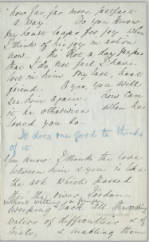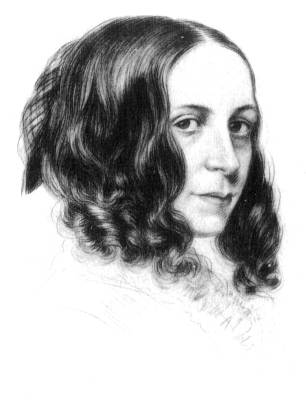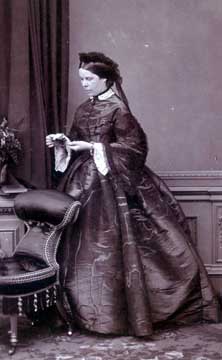|
Mary Elizabeth Mohl
Mary Elizabeth Mohl or Mary Elizabeth Clarke (22 February 1793 – 15 May 1883) was a British writer who was known as a salon hostess in Paris. She was known by her nickname of "Clarkey". She was admired for her independence and conversation. She eventually married the orientalist Julius von Mohl. She was an ardent Francophile, a feminist, and a close friend of Florence Nightingale. She wrote about her interest in the history of women's rights. Life Mary Elizabeth Clarke was born in Westminster in 1793.Patrick Waddington, 'Mohl, Mary Elizabeth (1793–1883)', ''Oxford Dictionary of National Biography'', Oxford University Press, 2004; online edn, Jan 200accessed 5 Feb 2015/ref> After the death of her father, Charles Clarke, Mary, at age 8, her mother, Elizabeth, and grandmother moved to France in 1801. Both her guardians were strong and independent-minded women. Her Scottish grandmother had hobnobbed with thinkers like David Hume and Adam Smith in Edinburgh and before the Frenc ... [...More Info...] [...Related Items...] OR: [Wikipedia] [Google] [Baidu] |
Westminster
Westminster is an area of Central London, part of the wider City of Westminster. The area, which extends from the River Thames to Oxford Street, has many visitor attractions and historic landmarks, including the Palace of Westminster, Buckingham Palace, Westminster Abbey, Westminster Cathedral and much of the West End shopping and entertainment district. The name ( ang, Westmynstre) originated from the informal description of the abbey church and royal peculiar of St Peter's (Westminster Abbey), west of the City of London (until the English Reformation there was also an Eastminster, near the Tower of London, in the East End of London). The abbey's origins date from between the 7th and 10th centuries, but it rose to national prominence when rebuilt by Edward the Confessor in the 11th. Westminster has been the home of England's government since about 1200, and from 1707 the Government of the United Kingdom. In 1539, it became a city. Westminster is often used as a m ... [...More Info...] [...Related Items...] OR: [Wikipedia] [Google] [Baidu] |
Elizabeth Barrett Browning
Elizabeth Barrett Browning (née Moulton-Barrett; 6 March 1806 – 29 June 1861) was an English poet of the Victorian era, popular in Britain and the United States during her lifetime. Born in County Durham, the eldest of 12 children, Elizabeth Barrett wrote poetry from the age of eleven. Her mother's collection of her poems forms one of the largest extant collections of juvenilia by any English writer. At 15, she became ill, suffering intense head and spinal pain for the rest of her life. Later in life, she also developed lung problems, possibly tuberculosis. She took laudanum for the pain from an early age, which is likely to have contributed to her frail health. In the 1840s, Elizabeth was introduced to literary society through her distant cousin and patron John Kenyon. Her first adult collection of poems was published in 1838, and she wrote prolifically between 1841 and 1844, producing poetry, translation, and prose. She campaigned for the abolition of slavery, and her w ... [...More Info...] [...Related Items...] OR: [Wikipedia] [Google] [Baidu] |
British Expatriates In France
British may refer to: Peoples, culture, and language * British people, nationals or natives of the United Kingdom, British Overseas Territories, and Crown Dependencies. ** Britishness, the British identity and common culture * British English, the English language as spoken and written in the United Kingdom or, more broadly, throughout the British Isles * Celtic Britons, an ancient ethno-linguistic group * Brittonic languages, a branch of the Insular Celtic language family (formerly called British) ** Common Brittonic, an ancient language Other uses *''Brit(ish)'', a 2018 memoir by Afua Hirsch *People or things associated with: ** Great Britain, an island ** United Kingdom, a sovereign state ** Kingdom of Great Britain (1707–1800) ** United Kingdom of Great Britain and Ireland (1801–1922) See also * Terminology of the British Isles * Alternative names for the British * English (other) * Britannic (other) * British Isles * Brit (other) * Briton (d ... [...More Info...] [...Related Items...] OR: [Wikipedia] [Google] [Baidu] |
British Women Writers
British may refer to: Peoples, culture, and language * British people, nationals or natives of the United Kingdom, British Overseas Territories, and Crown Dependencies. ** Britishness, the British identity and common culture * British English, the English language as spoken and written in the United Kingdom or, more broadly, throughout the British Isles * Celtic Britons, an ancient ethno-linguistic group * Brittonic languages, a branch of the Insular Celtic language family (formerly called British) ** Common Brittonic, an ancient language Other uses *''Brit(ish)'', a 2018 memoir by Afua Hirsch *People or things associated with: ** Great Britain, an island ** United Kingdom, a sovereign state ** Kingdom of Great Britain (1707–1800) ** United Kingdom of Great Britain and Ireland (1801–1922) See also * Terminology of the British Isles * Alternative names for the British * English (other) * Britannic (other) * British Isles * Brit (other) * B ... [...More Info...] [...Related Items...] OR: [Wikipedia] [Google] [Baidu] |
People From Westminster
A person ( : people) is a being that has certain capacities or attributes such as reason, morality, consciousness or self-consciousness, and being a part of a culturally established form of social relations such as kinship, ownership of property, or legal responsibility. The defining features of personhood and, consequently, what makes a person count as a person, differ widely among cultures and contexts. In addition to the question of personhood, of what makes a being count as a person to begin with, there are further questions about personal identity and self: both about what makes any particular person that particular person instead of another, and about what makes a person at one time the same person as they were or will be at another time despite any intervening changes. The plural form "people" is often used to refer to an entire nation or ethnic group (as in "a people"), and this was the original meaning of the word; it subsequently acquired its use as a plural form of per ... [...More Info...] [...Related Items...] OR: [Wikipedia] [Google] [Baidu] |
1883 Deaths
Events January–March * January 4 – ''Life (magazine), Life'' magazine is founded in Los Angeles, California, United States. * January 10 – A Newhall House Hotel Fire, fire at the Newhall Hotel in Milwaukee, Wisconsin, United States, kills 73 people. * January 16 – The Pendleton Civil Service Reform Act, establishing the United States civil service, is passed. * January 19 – The first electric lighting system employing overhead wires begins service in Roselle, New Jersey, United States, installed by Thomas Edison. * February – ''The Adventures of Pinocchio'' by Carlo Collodi is first published complete in book form, in Italy. * February 15 – Tokyo Electrical Lightning Grid, predecessor of Tokyo Electrical Power (TEPCO), one of the largest electrical grids in Asia and the world, is founded in Japan. * February 16 – The ''Ladies' Home Journal'' is published for the first time, in the United States. * February 23 – Al ... [...More Info...] [...Related Items...] OR: [Wikipedia] [Google] [Baidu] |
1793 Births
The French Republic introduced the French Revolutionary Calendar starting with the year I. Events January–June * January 7 – The Ebel riot occurs in Sweden. * January 9 – Jean-Pierre Blanchard becomes the first to fly in a gas balloon in the United States. * January 13 – Nicolas Jean Hugon de Bassville, a representative of Revolutionary France, is lynched by a mob in Rome. * January 21 – French Revolution: After being found guilty of treason by the French National Convention, ''Citizen Capet'', Louis XVI of France, is guillotined in Paris. * January 23 – Second Partition of Poland: The Russian Empire and the Kingdom of Prussia partition the Polish–Lithuanian Commonwealth. * February – In Manchester, Vermont, the wife of a captain falls ill, probably with tuberculosis. Some locals believe that the cause of her illness is that a demon vampire is sucking her blood. As a cure, Timothy Mead burns the heart of a deceased person in ... [...More Info...] [...Related Items...] OR: [Wikipedia] [Google] [Baidu] |
Paris
Paris () is the capital and most populous city of France, with an estimated population of 2,165,423 residents in 2019 in an area of more than 105 km² (41 sq mi), making it the 30th most densely populated city in the world in 2020. Since the 17th century, Paris has been one of the world's major centres of finance, diplomacy, commerce, fashion, gastronomy, and science. For its leading role in the arts and sciences, as well as its very early system of street lighting, in the 19th century it became known as "the City of Light". Like London, prior to the Second World War, it was also sometimes called the capital of the world. The City of Paris is the centre of the Île-de-France region, or Paris Region, with an estimated population of 12,262,544 in 2019, or about 19% of the population of France, making the region France's primate city. The Paris Region had a GDP of €739 billion ($743 billion) in 2019, which is the highest in Europe. According to the Economist Intelli ... [...More Info...] [...Related Items...] OR: [Wikipedia] [Google] [Baidu] |
Wives And Daughters
''Wives and Daughters, An Every-Day Story'' is a novel by Elizabeth Gaskell, first published in the ''Cornhill Magazine'' as a serial from August 1864 to January 1866. It was partly written whilst Gaskell was staying with the salon hostess Mary Elizabeth Mohl at her home on the Rue de Bac in Paris. When Mrs Gaskell died suddenly in 1865, it was not quite complete, and the last section was written by Frederick Greenwood. The story is about Molly Gibson, the only daughter of a widowed doctor living in a provincial English town in the 1830s. Plot summary The novel opens with Molly Gibson as a young child, being raised by her widowed father, Mr. Gibson, the local doctor. During a visit to the local aristocratic 'great house' of Lord and Lady Cumnor, Molly loses her way on the grounds of the estate and falls asleep under a tree. Lady Cuxhaven (one of the daughters of the house) and Mrs. Kirkpatrick (a former governess to the Cumnor children) find Molly and put her to bed in Mrs ... [...More Info...] [...Related Items...] OR: [Wikipedia] [Google] [Baidu] |
Württemberg
Württemberg ( ; ) is a historical German territory roughly corresponding to the cultural and linguistic region of Swabia. The main town of the region is Stuttgart. Together with Baden and Hohenzollern, two other historical territories, Württemberg now forms the Federal State of Baden-Württemberg. Württemberg was formerly also spelled Würtemberg and Wirtemberg. History Originally part of the old Duchy of Swabia, its history can be summarized in the following periods: *County of Württemberg (1083–1495) * Duchy of Württemberg (1495–1803) *Electorate of Württemberg (1803–1806) *Kingdom of Württemberg (1806–1918) *Free People's State of Württemberg (1918–1945) After World War II, it was split into Württemberg-Baden and Württemberg-Hohenzollern due to the different occupation zones of the United States and France. Finally, in 1952, it was integrated into Baden-Württemberg. Stuttgart, the historical capital city of Württemberg, became the capital of the p ... [...More Info...] [...Related Items...] OR: [Wikipedia] [Google] [Baidu] |
Elizabeth Gaskell
Elizabeth Cleghorn Gaskell (''née'' Stevenson; 29 September 1810 – 12 November 1865), often referred to as Mrs Gaskell, was an English novelist, biographer and short story writer. Her novels offer a detailed portrait of the lives of many strata of Victorian society, including the very poor. Her work is of interest to social historians as well as readers of literature. Her first novel, ''Mary Barton'', was published in 1848. Gaskell's ''The Life of Charlotte Brontë'', published in 1857, was the first biography of Charlotte Brontë. In this biography, she wrote only of the moral, sophisticated things in Brontë's life; the rest she omitted, deciding certain, more salacious aspects were better kept hidden. Among Gaskell's best known novels are '' Cranford'' (1851–53), ''North and South'' (1854–55), and ''Wives and Daughters'' (1865), all having been adapted for television by the BBC. Early life Gaskell was born Elizabeth Cleghorn Stevenson on 29 September 1810 in Lindsey ... [...More Info...] [...Related Items...] OR: [Wikipedia] [Google] [Baidu] |
Augusta Stanley
Lady Augusta Elizabeth Frederica Stanley (3 April 1822 – 1 March 1876), was daughter of Thomas Bruce, 7th Earl of Elgin and Elizabeth Oswald, Countess of Elgin. She was brought up in Paris after her father died. She was lady in waiting to Queen Victoria. She met and later married Arthur P. Stanley, Dean of Westminster at the home of Mary Elizabeth Mohl in Paris. She unveiled Joseph Edgar Boehm's statue of John Bunyan in Bedford in 1874. She is buried alongside her husband in Henry VII's chapel in Westminster Abbey. A memorial to Lady Augusta, commissioned by Her Majesty, Queen Victoria, stands at Frogmore. Bibliography Some of Stanley's letters are published in ''Letters of Lady Augusta Stanley: A Young Lady at Court 1849-1863'' edited by the Dean of Windsor and Hector Bolitho Henry Hector Bolitho (28 May 1897 – 12 September 1974) was a New Zealand writer, novelist and biographer, who had 59 books published. Widely travelled, he spent most of his career in England. Bio ... [...More Info...] [...Related Items...] OR: [Wikipedia] [Google] [Baidu] |



_1938.jpg)





